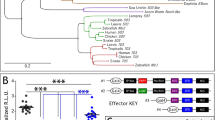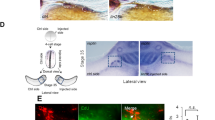Abstract
THE int-2 proto-oncogene encodes several products related to the fibroblast growth factor (FGF) family1,2. FGFs have been associated with mesoderm induction in the amphibian embryo2,3 and int-2 has a distinct pattern of expression throughout development in vertebrates4,5. But evidence for a function of int-2 in embryo-genesis has been lacking. In the mouse embryo, int-2 transcripts have been detected in the rhombencephalon at a developmental stage where classical experiments showed that the induction of the inner ear occurs6,7. This raises the possibility that int-2 may constitute a signal for the induction of the otic vesicle, the primor-dium of the inner ear. We provide direct evidence for this view by showing that (1) the formation of the otic vesicle is inhibited by antisense oligonucleotides targeted to the secreted form of int-2, and by antibodies against int-2 oncoproteins, and (2) basic FGF (bFGF) can mimic the inductive signal in the absence of the rhombencephalon.
This is a preview of subscription content, access via your institution
Access options
Subscribe to this journal
Receive 51 print issues and online access
$199.00 per year
only $3.90 per issue
Buy this article
- Purchase on Springer Link
- Instant access to full article PDF
Prices may be subject to local taxes which are calculated during checkout
Similar content being viewed by others
References
Moore, R. et al. EMBO J. 5, 919–924 (1986).
Gospodarowicz, D. Curr. Topics Dev. 24, 57–93 (1990).
Slack, J. M. W., Darlington, B. G., Heath, J. K. & Godsave, S. F. Nature 326, 197–200 (1987).
Wilkinson, D. G., Peters, G., Dickson, C. & McMahon, A. P. EMBO J. 3, 691–695 (1988).
Wilkinson, D. G., Bhatt, S. & McMahon, A. P. Development 105, 131–136 (1989).
Waddington, C. H. J. exp. Biol. 14, 232–239 (1937).
Van de Water, T. R. & Conley, E. Anat. Rec. 202, 195A (1982).
Alvarez, I. S. & Navascues, J. Anat. Rec. 228, 315–326 (1990).
Acland, P., Dixon, M., Peters, G. & Dickson, C. Nature 343, 662–665 (1990).
Schoenwolf, G. C. & Smith, J. L. Development 109, 243–270 (1990).
Represa, J., Sanchez, J. A., Miner, C., Lewis, J. & Giraldez, F. Development 110, 1081–1090 (1990).
Lumsden, A. G. S. & Davies, A. M. Nature 306, 786–788 (1983).
Dodgson, J. B. et al. J. biol. Chem. 258, 12685–12692 (1983).
Giraldez, F., Represa, J., Borondo, L. & Barbosa, E. Development 100, 271–278 (1987).
Hamburger, V. & Hamilton, H. L. J. Morph. 88, 49–92 (1951).
Author information
Authors and Affiliations
Rights and permissions
About this article
Cite this article
Represa, J., León, Y., Miner, C. et al. The int-2 proto-oncogene is responsible for induction of the inner ear. Nature 353, 561–563 (1991). https://doi.org/10.1038/353561a0
Received:
Accepted:
Issue Date:
DOI: https://doi.org/10.1038/353561a0
This article is cited by
-
Identification of a 7-gene signature that predicts relapse and survival for early stage patients with cervical carcinoma
Medical Oncology (2012)
-
Syndromic congenital sensorineural deafness, microtia and microdontia resulting from a novel homoallelic mutation in fibroblast growth factor 3 (FGF3)
European Journal of Human Genetics (2009)
-
FGF4 and INT2 Oncogenes Are Amplified and Expressed in Kaposi's Sarcoma
Modern Pathology (2000)
-
Embryonic retinoic acid synthesis is essential for early mouse post-implantation development
Nature Genetics (1999)
Comments
By submitting a comment you agree to abide by our Terms and Community Guidelines. If you find something abusive or that does not comply with our terms or guidelines please flag it as inappropriate.



